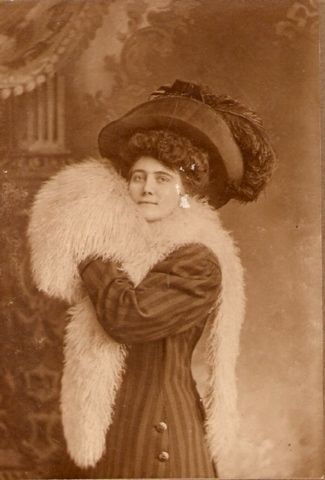My sister the Chef is named after our great-great-grandmother. It’s a very unusual name: so unusual, in fact, that every single google result for it is about GGGrandmother, one of her ancestors, or one of the five women named after her, including my sister.
So I won’t be telling you GGGrandmother’s name, because my sister deserves a little privacy on the internets. Instead, I’ll call her Anna, a name she sometimes used, perhaps because it was easier for the general public to pronounce and wrap their head around.
Growing up, I wondered why my sister was named after our GGGrandmother. I’m named after my paternal grandmother, and my youngest sister after our maternal grandmother, but three generations back is a long way to go for a name. And why all those other women (and men, carrying the slightly more common masculine version of her name)?
The answer, at least in part, is the story of her life. As a child I was told a very simple version of it: a child friendly, bowlderised version (not my parent’s whitewash, simple them repeating the version they had heard), but as an adult I’ve come across other versions, and read accounts from the time, and put together the dates and known facts. In doing so, it’s become apparent that Anna’s tale is infinitely more tragic than the one I grew up with.
This is Anna’s story as I understand it. There are slightly differing accounts across the different branches of the family, and disagreement on some of the details, so I have simply chosen the ones that best match the facts, or make a cohesive story without affecting the truth of the tale.
NOTE: The following story is very, very sad. It doesn’t involve any human cruelty (the hardest kind of sad), but it is nonetheless absolutely heartbreaking, so if you are feeling down you might want to skip it and click on the ‘Felicity’ tag instead and cheer yourself up with cute kitty posts.
Anna was born in Michigan in the 1860s, the daughter of Dutch-ish immigrants (the Netherlands being a slightly different thing at the time). Her parents struggled with the stony Michigan ground and woods, and so they moved the family to the plains of the newly opened Dakota territories, where she met and married Jacob, another Dutch-ish immigrant.
Jacob was a carpenter and well-digger. The new couple settled on a homestead, with a house and a barn. A year after their marriage Anna became pregnant, but sadly, the child died at birth. A year and a bit later there was another pregnancy, and Anna gave birth to a healthy baby girl (we’ll call her Gertie).
Gertie was barely two years old when Anna went into labour with a third pregnancy. The labour did not go well, so Jacob rushed the mile or two into town for a doctor, taking Gertie with him, so as not to leave the responsibility of her with Anna.
It was the end of winter, and as Jacob neared town, a terrible blizzard swept in. He and Gertie made it to the town, but they were trapped at the doctor’s house as the blizzard raged around them, frantic with worry for Anna, alone, and in labour, in a cold little house in the vast prairie. Attempts to get back to Anna were futile.
It was almost three days before the blizzard cleared enough for Jacob, the doctor, and some friends to rush back to the homestead. As they neared it, the worst possible sight met their eyes. The house was a smoking ruin: destroyed by fire.
They raced to the house, calling Anna’s name frantically, hoping against hope that she had survived her labour, the fire, and the blizzard.
They finally found her collapsed at the door of the barn, dead from exposure, her body curled protectively around her tiny baby. Amazingly, the baby, just three days old, had survived.
Anna had managed to give birth on her own, cut the cord and deal with the afterbirth and dress and wrap her baby. Sometime in the wait for her husband the stove had caught on fire, and Anna, weakened from labour and with an infant, was unable to fight it. She’d attempted to make her way to the barn in the raging blizzard, and while she couldn’t save her own life, she’d given it to enable her infant to live. She wasn’t even 25.
The tiny infant was my great-grandfather. Named after his mother, he was called Bert. He was sent to be raised by relatives until he was 12.
I posted a photo of his older sister, Gertie, on Facebook yesterday. She was married by the time she was 20 (this photo, taken in 1907 or 1908, was probably done just before or at the time of her marriage). She had four children of her own, but also sadly died young: just a decade older than her mother. I wonder if she remembered Anna at all, in faint memories of lullabies or being held.


Oh, dear. You are right – what a sad, sad story. Yet Anna was a hero – going through childbirth, then the fire, and saving her baby, all alone in the middle of nowhere. She is indeed an ancestor to be proud of. I’m glad you shared her story with us.
It’s very sad, but ultimately, it’s about the fierce, FIERCE love of a mother giving all for her child. Without that, you wouldn’t be here and your sister is blessed to be named for such a strong, brave woman. It makes me proud of our entire sex when I hear stories like this one.
Tracey
I’m going to link to the Amazon even though that’s not my favorite, but because it’s quickest. I don’t know if this is the same blizzard, but it’s a similar story at a similar time. It was deeply moving for me to read and might have something to offer you.
I’ve removed your amazon link because it didn’t work. I know the blizzard you are talking about: the Schoolhouse Blizzard of ’88. It’s not the blizzard of this story, though I’m sure the family would have been affected by it. Interestingly, the Schoolhouse Blizzard would have happened when Gertie was just a few days old.
Thank you for sharing the story of a young mother’s love. My family has a few of those, also. There is a family cemetery that we visit, with several young mothers buried there. Some with their babies. I can’t imagine the courage, but know that if I were born in an earlier century, it may be me. Thanks to modern medicine and c-sections, I have the privilege of raising my children.
How nice that your parents honored her.
That is the story of a heroic heart. Wow.
So sad! Thank you for sharing this story of a mother’s love
What an amazing story! I know it’s sad but so wonderful to know what your ggggranny did to help her son. Is this the “X” sister? I did not know she was a chef! That’s great!!!
Yes, that’s the sister. She now spends half her time being a chef at fancy seasonal resorts and the rest of it tramping – lucky thing!
I’ve changed your letter to ‘X’, just in case.
Wow! What an amazing story!
She was such an amazing and brave person! What a blessing to be able to tell her story and call her one of your ancestors!
thank you
Cassie
Wow, thanks for sharing such a personal story. It is amazing to think of what women did and I think it is cool that your family has kept the memories alive by handing down the name.
Thank you for this story. It’s extremely sad, but what a beautiful act, to give up so much to save the life of her child! I am in awe of your g-g-grandmother. She was an amazingly strong woman, and someone to definitely be proud of.
Oh my gosh. This story was so hard to finish. I was “hoping upon hope” that they both somehow survived, but you gave us a forewarning, so I knew someone was gonna go. I’m so happy the baby survived to be your great-grandpa! I can believe the kind of sacrifice and decisions a mother will make for her unborn baby. As I read this, I’m currently at the start of the third trimester of my first pregnancy. Out of curiosity, I had read some advice from the 1800’s on pregnancy and it was a bit terrifying. Pregnancy was not a thing to take lightly as many women died in childbirth, and after my own serious health scares in this pregnancy, I can see how it could happen! In any case, thanks for sharing your family history, it was fascinating and sorrowful, but beautiful nonetheless.
Although the story is sad, it’s also that good kind of sad, chicken soup for the soul type. Thank you so much for sharing.
It is a very sad story. Sad in a good way, in the sense that it’s a story about love, but so very sad. I consider myself very lucky to live in a time and place where it’s unusual for mothers to die while their children are young. It must have been quite common in those days before modern medicine and when travel was so difficult and people were so isolated. Your GGGrandmother was a hero by anyone’s definition.
Dear Leimomi,
What parent wouldn’t catch their breath and mourn on reading or hearing this portion of your family’s history? Oh, bravery.
Very best,
Natalie
So, a friend-of-a-friend got accepted to the Mars mission. This friend and I were talking about it. She, being from midwest, couldn’t fathom leaving everyone for something so harsh and unknown and dangerous. Me, with both sides of the family being pioneers and their troubles still in living memory, was more sanguine. This is simply what my people (and your people did), and so I figured that the Mars folks had a similar outlook.
Not that I would be tough enough to do that! Your story illustrates how awful it could have been. I also wonder if western women could have had easier births, since they were not so corseted up as their eastern counterparts.
We have so much to be thankful for as medicine progresses, equality for women is within sight, and people connect and help one another. I am very sorry for your family’s tragedy, and the other tragedies that were hinted at, above.